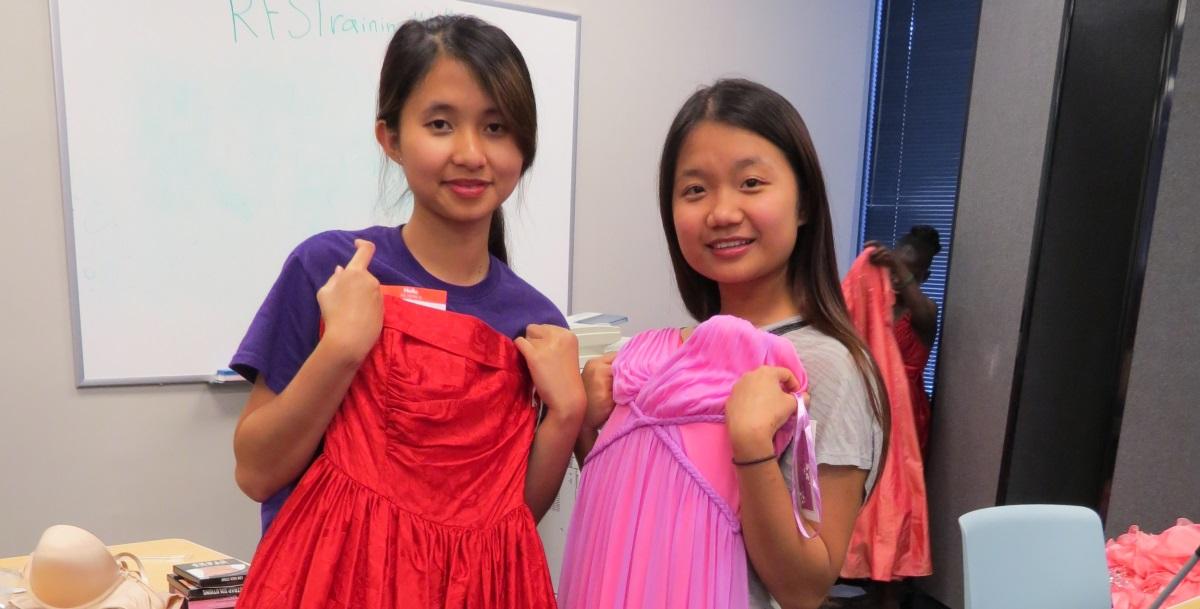Clarkston Programs Give Prom Experience To Refugee Girls

Stephanie Ali / New American Pathways
When she was 13 years old, Moza Yena moved to Clarkston, Georgia as a refugee from the Democratic Republic of Congo. Now 18, this teenager is facing one of the most universal experiences of American teenage life: high school prom.
“The first time I heard about prom, based on how someone described it to me,” Yena said, “it’s a type of formal dance where you go with your class and you have fun.”
This year, Yena will be modeling a dressy red gown on the dance floor at her senior prom. She picked out her dress through the International Rescue Committee, a local refugee resettlement organization. This was the organization’s second prom dress drive, in which the organization passed along gently used donated dresses to the young refugee women in its after-school program at Clarkston High School.
The small metro Atlanta city of Clarkston has become a hub for refugee resettlement by the IRC and other resettlement organizations over the past 20 years. The city’s high school has students from more than 54 countries and who can speak 47 respective languages, according to Clarkston High School’s website.
For many of those students whose families came to the United States as refugees, IRC Youth Program supervisor Whitney Stovall said prom dresses and tickets might not be in the budget.
“As a young girl, no matter where you are in high school, prom is something you definitely want to be a part of,” Stovall said.
To help out the girls in their program, the IRC reached out to the local community through Facebook and existing partnerships, asking for prom dresses in any style or size. According to Stovall, the six-week-long drive collected “a lot more dresses than [we] ever could have expected.”
New American Pathways, another refugee resettlement program in the area, also conducts a prom dress drive for the refugee girls in its extracurricular program. The girls in this program, who go to different high schools around DeKalb County, have to fulfill volunteer hours to earn a dress.
Stephanie Ali with New American Pathways says a lot of the girls in their program, all of whom are first- or second-generation refugees, are “just starting to see what prom does to an American high school.” Many of the girls might not even attend prom with the dresses they earned through the program, but they still gather eagerly for the organization’s “Prom Day.”
On that day, the girls listen to talks about female empowerment and women in the media. Then, the organization invites guests in to teach the girls about how to style their hair and makeup in a way that emphasizes their “natural beauty.”
“I’ve never seen every single one of them more focused than during the hair and makeup,” Ali said with a laugh.
Ali said the prom program is designed to tie the quintessential high school event into lessons about self-empowerment and self-esteem – while also letting the girls have some teenage fun.
Yena is looking forward to attending her first – and last – prom as the encapsulation of her high school years.
“Prom is a chance for you to have good memories with all your high school friends,” she said, “because after graduation, chances are you might not be able to see them … You never know what will happen in life.”
After graduation, Yena hopes to study medicine in college and become a OBGYN practitioner. But before donning her black graduation robes, she’ll put on her red formal dress for one lasting memory of high school.
9(MDAxODM0MDY4MDEyMTY4NDA3MzI3YjkzMw004))








